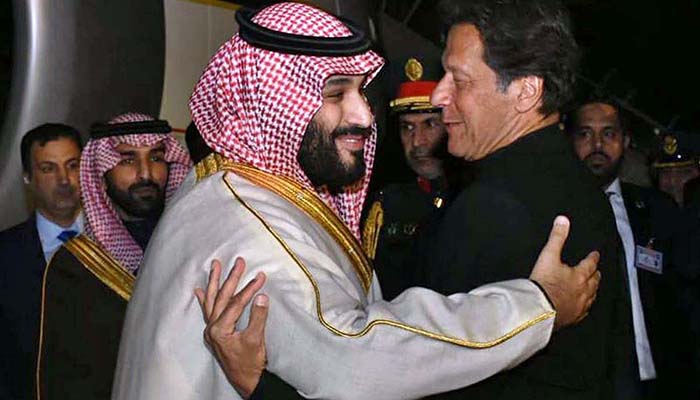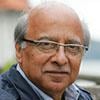Sound bites: A new phase in Pak-Saudi ties?
Political experts weigh in on what the Saudi Crown Prince’s visit means for Pakistan in the long run.
February 18, 2019

On Sunday, Saudi Arabia’s Crown Prince Mohammed bin Salman arrived in Pakistan for a two-day visit. Soon after his arrival, Pakistan and Saudi Arabia signed seven MoUs and investment deals worth $20 billion.
Prime Minister Imran Khan’s first foreign trip, after being elected in July, was to Saudi Arabia on September 18.
Political leaders, across the divide, are calling the visit “historic” for the Pak-Saudi relations. Is it really a new chapter in bilateral ties between the two countries? Experts weigh in:
“Visit signals to the world that Pakistan has a conducive environment for investment”
Saudi Arabia has offered three types of economic support to Pakistan prior to, and, during Crown Prince Muhammad bin Salman’s visit to Pakistan: $3 billion for coping with international loan repayments; supply of oil worth $3 billion on deferred payment; and an investment package worth $20 billion that includes an oil refinery project in Gwadar, Pakistan.
The Crown Prince also promised to invest more in Pakistan in the future. The two countries could go for joint ventures in defence production.
The Saudi financial support and investment is excellent news for Pakistan, at a time when its economy was faltering under the pressure of foreign debts, budget deficit, a negative trade balance and a plummeting exchange rate for the Pakistani Rupee.
Saudi financial support has provided breathing space to the newly-elected government to take effective measures to strengthen the internal sources of Pakistan’s economy. It will also help reduce unemployment and poverty.
Saudi investment will contribute to removing the impression at the global level that Pakistan had a non-conducive domestic environment for investment because of terrorism and political incoherence and conflict. Saudi Arabia’s decision to expand economic ties with Pakistan, especially new investment, sets the stage for Pakistan to cultivate positive interaction with other states in a globalized world, that values free movement of goods, services, ideas and human beings across the territorial boundaries of states.
Some Arab countries like the United Arab Emirates and Qatar are also expected to invest in Pakistan which will encourage investments from non-Arab sources. Further, Saudi investment will not adversely affect the China-Pakistan Economic Corridor (CPEC); rather, it will increase the importance of the CPEC and the industrial projects associated with it because more people would benefit from it than originally envisaged.
If Pakistan’s economy becomes secure and stable, it will be better placed to pursue its security and foreign policy goals in a more autonomous manner. In the present day uncertain global environment, stable economy and coherent political and societal conditions are pre-requisites for a vibrant foreign policy.
Pakistan will not be able to benefit fully from the positive and multifaceted interaction with Saudi Arabia and other countries without ensuring good governance, improving infrastructure facilities, removing administrative bottlenecks in the processing of foreign investment, controlling bureaucratic inefficiency and eliminating corruption in government.
Saudi investment is an opportunity as well as a challenge for Pakistan.
Dr. Hasan Askari Rizvi is a political analyst, who served as the caretaker chief minister of Punjab.
“From rent-seeking to economic partners”
This is an important visit for Pakistan, given the financial and economic crunch the country is passing through. The fact that the Crown Prince kicked off his Asia tour from Pakistan, is in itself significant.
After last year’s events, Saudi Arabia was facing isolation at the international level. At such a difficult juncture, Pakistan’s solidarity and efforts left an impact on Saudi Arabia. Which is why in the maiden visit of the Crown Prince, the two countries signed seven memorandum of understanding (MOU).
Saudi Arabia has been financially supporting Pakistan for several decades now, but with these large investments, the relationship may change from that of a rent-seeking economy to economic partners, which will, of course, go in Pakistan’s favour in the long run.
That said, it is important that the parliament and Senate, including the opposition parties, should also be provided with the complete details of the loans and investment, and if any conditions come attached.
Pakistan is not in a position to pick sides in the Middle East conflicts. We must going forward, maintain our neutrality.
Mehmal Sarfraz is a political analyst
.
“Pakistan is now forging a future away from conflict and regional tensions”
“Pakistan is now forging a future away from conflict and regional tensions”
The Saudi visit of Pakistan, led by the Crown Prince Mohammad Bin Salman, comes at a critical juncture in Pakistan’s socio-political and economic journey.
The relations between the two nations are old, deep and fraternal. Even temporary dips in relations, like when Pakistan opted to remain neutral in the Yemen conflict in 2015, do not tend to shadow these for too long. This visit comes at a time when Pakistan is emerging, almost victoriously, out of a long war against terrorism and extremism in the country and is on a path to forge a future away from conflict, strife and perpetual regional tensions.
Its focus is on the economy and its people as it endeavours to repair its relations and replace those with more abiding economic links. The CPEC is one such artery around which portends such a possibility. Saudi Arabia will perhaps be the first such nation to add value to this potential created by China and Pakistan. As peace realizes more nations in the region will plug in. This is Pakistan’s interest.
Saudi Arabia, long a single commodity economy, is also desperate to change its old ways of socio-economic existence. Education, trade, minerals, energy and agriculture is where it would like to pin its interest and plug into creating its own foot-hold enabled by the rather liberal regimes for foreign investment offered by Pakistan.
The CPEC will be the natural contour around which such opportunities emerge. By Saudi assessment, such permanent presence can enable it to collocate where Iran exists.
Competitiveness can replace politically or militarily strategic motives of all stakeholders enabled by the making of a connected region. The stage is set for Pakistan to determine the future trajectory of this new potential. This will be Pakistan’s cross to carry.
Air Vice Marshall (retd) Shahzad Chaudhry is a political and security analyst.
.“Pakistan needs to turn the MoUs into reality”
"Pakistan needs to turn MoUs into reality"
"His Highness Mohammad Bin Salman has instructed us to turn this into a strategic relationship,” said Saudi minister for trade, Majid bin Abdullah al Kasbi, during a meeting of businessmen. The sentence alone sums up the direction that the Saudi-Pak relations are likely to take with the help of the MoUs worth $ 20 billion.
If China stuck its neck out through the China-Pakistan Economic Corridor (CPEC) in 2015, in helping Pakistan revive its fledgeling economy, the Saudi pledge of massive investments amount to a huge shot in the arm. The former focused on energy generation and infrastructure, the latter will be growth-focused i.e. production capacity building, which will generate jobs, save precious resources and also become a big-time source of cash revenue.
It is a convergence of mutual interests, primarily anchored in new geo-economic realities. Pakistan now has an appetite for solid growth-centric, foreign investment. As for the Saudis, their Vision 2030 seeks to cut its current overriding dependence on oil and aims to transition to fixed, revenue generating investments abroad.
This way, Saudi rulers want to diversify the source of income and also stagger possible risks (financial collapse like the one in 2008, and the looming threat of adverse relations with the United States which can always use assets’ freeze to arm-twist the regime for own agendas). Saudis will part even higher amounts in India and China for the same reason.
But this quest for diverse streams of revenue certainly comes in handy for Pakistan.
The only challenge is that the Coordination Council has to expeditiously create an environment in Pakistan with planning and management capacities. This is a formidable challenge but not insurmountable if Pakistan embraces the UAE model of development i.e co-opting foreign and Pakistan-origin technocrats and put them in-charge for translating the MoUs into reality. We shall have to find a way around the current bureaucracy-led planning commission regime if we want to reap dividends off CPEC and Saudi investments.
Imtiaz Gul heads the Islamabad-based Independent Centre for Research and Security Studies.














